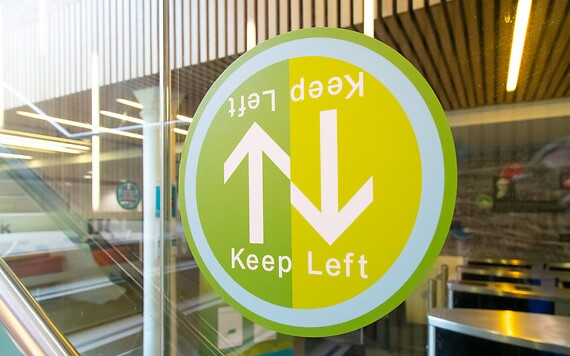Staff Mental Health and Wellbeing Plan
- Foreword by Professor Peter Fonagy
Health economists have established substantial benefits accruing for employers through close attention to the wellbeing of staff. Research on presenteeism and absenteeism unequivocally show the cost of insufficient consideration of issues of mental health. And all that was before Covid-19.
The UK household longitudinal survey suggests that in April 2020, 30% of adults reported levels of mental stress indicative that treatment may be needed, compared to around 20% between 2017 and 2019. The estimated prevalence of common mental disorders was 34% in May and 31% in June, 50% higher than was recorded between 2017 and 2019 . The proportion of people experiencing sleep problems also increased from 15% to 26%. The ONS survey confirms in a follow-up of people surveyed between July 2019 and March 2020 and then again in June 2020, an increase in the proportion of people reporting depression symptoms and those symptoms being worse than previously reported . New longitudinal studies show a moderate decrease in anxiety through April and May but the same study worryingly suggests that less than half of those affected by abuse, self-harm and thoughts of suicide or self-harm accessed formal or informal support during April 2020.
Such measures of population mental health are useful in contextualising the burden that we individually may feel. But there is good evidence that we are not equally affected. The Covid-19 pandemic has had larger adverse impacts on the mental health and wellbeing of particular groups. In general, those most at risk pre-pandemic were more likely to report deteriorating mental health during the lockdown: the young (yes, the people we are all here for), particularly young women, those with caring responsibilities, those with pre-existing mental health conditions and those on low income or who are unemployed. However, there is also evidence of increasing mental distress among some employed adults, as well as among adults with more educational qualifications .low income or who are unemployed. However, there is also evidence of increasing mental distress among some employed adults, as well as among adults with more educational qualifications.
None of this is likely to be news. The pressures on university staff, both academic and professional services, have been extraordinary over the past months. Nor does it look likely to relent any time soon. Most of us, probably along with our Government, had optimistically assumed that pretty soon this would be all over. Thinking of the pandemic as something that is going to be with us for the next year or two at least is in itself a ‘stress inducing’ ‘depressogenic’ idea. The Staff Mental Health and Wellbeing Plan is a thoughtful, evidence-based initiative that has come at the right time for UCL. It offers a comprehensive and wide-ranging set of proposals, based on the best available evidence. The Workplace Health team have done an excellent job in bringing together some of the key principles for supporting good mental health within organisations.
Overall the plan is both comprehensive and pragmatic, offering measurable objectives which, if achieved, should reduce stress and mitigate some of the worst consequences of the prolonged stressful conditions we are currently obliged to endure. Running through the document is the recognition that resilience resides in relationships, and that work relationships are instantiated in teams (not MS Teams I hope). Whilst all of us have a propensity to underestimate this, the most important factors for our physical and mental wellbeing are social ones: the cohesiveness of the social group we are in and the quality of the social support that we receive. Exercise, weight loss, physical activity and even quitting smoking come some way behind.
What does this mean for all of us? Having a supportive team is a priority. Having working relationships where we feel recognised and valued is of paramount importance. The workplace communities of research and work-groups are all. As the plan emphasises, wellbeing is everyone’s responsibility. A psychologically savvy supervisor with or without training can recognise distress as it emerges and may be able to intervene. Early recognition prevents the cascade of difficulties which elevated stress can cause and which can make intervention far more challenging and far less likely to succeed. Kindness, saying thank you and recognising effort are important for wellbeing at all times, but particularly so during periods of acute stress. At these times we are particularly vulnerable to feeling unappreciated and unacknowledged which can feed into stress-related self-doubt alongside doubts concerning the sincerity and supportiveness of those around us. The consequent sense of isolation, in turn increases our vulnerability. Being part of a team that functions together helps a lot.
UCL has been at the forefront of the nation’s fight against the pandemic with many departments and divisions, including mine, offering advice and services at the highest level nationally. Given the world leading quality of UCL research, this was and remains the appropriate role for academics within this university. It is heartening to see that the cutting-edge research that informs national and international perspectives is in this instance also forging the important partnership between central departments of UCL and academic departments and research centres. Workplace Wellbeing recognised early on the potential of harnessing knowledge and skills from sections of our academic community for the benefit of the entire university. The plan represents several years of building these partnerships to develop a genuinely evidence-based approach to staff wellbeing. In addition to informing UCL policies, these partnerships with groups such as the Centre for Behaviour Change, Eastman Dental Institute, Population Health Science, the Institute of Ophthalmology, the Division of Psychology and Language Sciences are all feeding into the health promotion calendar as are various staff groups such as Parents and Carers Together. Our own programme in PALS, PsychUp, focused on the application of psychological research and practice to student and staff wellbeing, is excited to start working with workplace wellbeing on the London Healthy Workplace Award and the Time to Change Campaign (Objectives 1 and 2 of the plan).
So why do we need this document? There are notable issues of stigma associated with mental health. Nowhere are these as significant and potentially destructive as in the workplace. In a university environment we may expect a more considerate and empathetic attitude. Sadly experience, both personal and institutional, shows all too clearly that this anticipated sophistication often fails to materialise. Bringing together physical and mental health effectively addresses some of these issues. Decades of work on adverse childhood experiences has taught us that the binary distinction between physical and mental illness makes little sense as the mechanisms generating both are biopsychosocial. It is appropriate that the UCL staff mental health and wellbeing plan should explicitly circumvent this inappropriate and now scientifically outdated distinction between body and mind when they are confronted with persistent adversity. Although psychological principles are helpful and important we must not over medicalise the issue of wellbeing. And this comes through this excellent plan. It is a systematic approach that reflects the professionalism of our organisation but without ever losing the sense that the priority must be to holistically recognise the needs and concerns of individual members of UCL staff.
The plan provides a strong infrastructure to support ambitious objectives. It assumes that we will act jointly as a community to support the plan and through it to support each other as we try to grapple with our daily chores which have almost inexplicably become just so much more difficult. The UCL Staff Mental Health and Wellbeing Plan is not another set of instructions about how to manage our work. It is what it should be: a framework for all of us to work together to help those around us and to advise us on how to do this to the best of our ability. We should acknowledge our indebtedness to a creative and generous team at UCL who have the task of holding the staff’s minds in mind.Professor Peter Fonagy OBE
Head of the Division of Psychology and Language Sciences
Director, UCLPartners Mental Health and Behaviour Change Programme
- Introduction and context
The COVID-19 pandemic has had a significant impact on the lives of the UCL community through ill health, stress and anxiety about personal wellbeing and that of family and friends, as well as the very significant economic impacts some families have faced. Most staff had to adapt to working from home quickly, using new technologies and many staff had caring and home-schooling responsibilities. Not all our staff have positive environments at home to work in. Whilst key workers were needed to keep our campus safe for staff and students who continued to be on site, others returned to the NHS in hugely challenging front line roles supporting the national effort and our fight against COVID-19. Now, as UCL moves into the 2020/21 academic year some staff and students will have begun to return to our COVID secure campus, deeply anxious about the ongoing impacts of the pandemic.
The World Health Organisation recognise that the pandemic is a physical health crisis and that it has the potential for a long-term impact on psychological health (Policy brief: Covid and mental health, 2020). Multiple sources have shown that mental health during the pandemic has been worse than prior to the pandemic. The COVID-19 Social Study led by Dr Daisy Fancourt and Professor Andrew Steptoe, a study of over 70,000 respondents and not representative of the UK population, shows that levels of depression and anxiety were worst at the start of lockdown and have decreased since then. However, depression and anxiety are still highest in young adults, people living alone and people living with children. People with a diagnosed mental illness have still been reporting higher levels of symptoms (COVID-19 Social Study, 2020).
The impact of COVID-19 is not fully known; however it is imperative that UCL continues to support the mental health and wellbeing of its people. The SMHWP acknowledges the Student Health and Wellbeing Strategy, the UCL Equity and Inclusion Plan and Sustainable UCL. It aims to support these plans through co-creation and collaboration.
- Definitions
- Wellbeing: "Creating an environment to promote a state of contentment which allows an employee to flourish and achieve their full potential for the benefit of themselves and their organisation” (CIPD)
- Health: Health is a state of complete physical, mental and social well-being and not merely the absence of disease or infirmity. The enjoyment of the highest attainable standard of health is one of the fundamental rights of every human being without distinction of race, religion, political belief, economic or social condition” (WHO)
- Psychological Safety: “a belief that one will not be punished or humiliated for speaking up with ideas, questions, concerns or mistakes and that the team is safe for interpersonal risk taking.” (Edmondson, 1999). Psychological safety is achieved through being able to show and employ one's self without fear of negative consequences of self-image, status or career and where team members feel accepted and respected.
- Responsibilities
The Staff Mental Health and Wellbeing Action Plan is everyone’s responsibility. Workplace Health lead on the design, implementation, have oversight and provide reports on progress.
- Individual level: Taking care of one’s own mental health and wellbeing, strengthening resilience, help seeking, developing skills and knowledge and being supportive to others.
- Team and management level: having realistic expectations, creating a sense of belonging, having conversations around mental health and being aware of the supports available.
- Department level: Supporting those in volunteer roles within UCL including Health and Wellbeing Champions and Mental Health First Aiders, wellbeing on operational meeting agendas, valuing the health and wellbeing contribution and activity.
- Workplace Health: Strategy design, communication and procurement of SMH&W supports, in collaboration with Organisational Development (OD), Equality Diversity and Inclusion (EDI) and our academic community.
- Faculty level: Embedding mental health and wellbeing into strategic planning, supported by HRBPs.
- Institutional level: Senior leaders’ role model through promoting the mental health and wellbeing of the UCL community in communication and in action
- Enablers
- Leadership: responsibility for the Mental Health and Wellbeing Plan is owned by SMT
- Co-production: contributions sought from staff including our networks (Black, Asian and minority ethnic (BAME), Lesbian, Gay, Bisexual, Transgender and Queer (LGBTQ), Parents and Carers Together (PaCT) etc) on helpful supports
- Co-creation: collaborating with UCL academics and professional services including the UCL Institute of Mental Health and UCL Health of the Public
- Partnerships: working in partnership with external organisations including PHE, UUK, Time to Change
- Communication: partner with CAM to create and deliver a communications plan that reaches all staff across the UCLs community using different platforms and voices
- Data: data analysis conducted to create a picture of MH&W, including Your Wellbeing pulse survey
- Insight: feedback sought on the success of interventions enabling continuous process of improvement of supports and strategy
- Mental Health and Wellbeing Aspirations
The SMHWP will be delivered through four broad objectives each set out with actions and measurement over the following pages. The aspirations set out below are UCLs aspirations that will be achieved through the SMHWP.
- We will promote an environment where staff mental health & wellbeing is embedded in operational practices; where wellbeing and a positive mental health culture are fundamental and integrated and not a ‘nice to have’
- We will empower staff to have confident conversations around mental health and wellbeing, to recognise and support those who require help; Show care for each other, feel valued and heard.
- We will promote self-care and offer a range of resources, tools, and supports accessible to staff to support their health and wellbeing.
- We will offer a range of supports through external partners, including Employee Assistance Programme (EAP) which provide emotional support, counselling and an information service; and work closely with our community to develop bespoke training resources for managers which embed wellbeing in practice
- We will work with colleagues in Communication and Media (CAM) to create a promotional campaign to raise awareness of all the mental health and wellbeing supports we have in place at UCL, offering clarity on what is available and the pathways to access.
- We recognise that student and staff mental health and wellbeing are connected and work in collaboration with our colleagues in Student Support and Wellbeing (SSW) to dovetail our offerings and share learning and insight
- Socialising the Staff Mental Health and Wellbeing plan
The SMHWP will be available on the UCL Workplace Health webpages, however for the plan to be successful it is important to socialise it in a way that is meaningful to our community. We will achieve this through socialising the SMHWP as Being Well at UCL which is made up of the four objectives set out over the following pages. The four objectives sit across the three themes of Healthy Mind, Healthy Body and Healthy Environment as shown in the graphic below. This will enable Workplace Health to create an area within the website for Being Well at UCL and for social media platforms to be utilised. UCL Workplace Wellbeing currently has nearly 1,100 followers, with a large proportion of these being internal. This will enable us to change the account name to Being_Well_UCL and capture our existing followers.
 Close
Close





